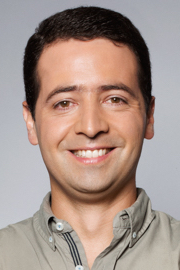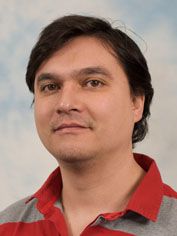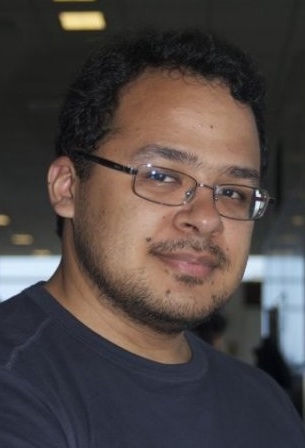
|
|
|
MDARB10 Microarray Data Analysis using R and Bioconductor |
|
IMPORTANT DATES for Course
|
Instructors: |

Nuno Barbosa-Morais graduated in Technologic Physics Engineering from Instituto Superior Técnico (Lisbon, Portugal) in 2000. He completed a Graduate Program in Biophysics and Biomedical Engineering at the University of Lisbon and then did his PhD in Biomedical Sciences at the University of Lisbon Medical School with Prof. Carmo Fonseca. Most of the PhD research actually took place at the University of Cambridge (UK) with Dr. Samuel Aparicio. He also visited the lab of Dr. Juan Valcarcel at EMBL (Heidelberg, Germany). His PhD work involved bioinformatics studies on the complexity of splicing and gene expression. Nuno is currently a Research Associate in the Computational Biology Group (led by Prof. Simon Tavaré), Department of Oncology of the University of Cambridge (UK), based at the CRUK Cambridge Research Institute. His main research is focused on understanding the complexity of gene expression regulation and its impact on disease mechanisms, namely oncogenesis. Nuno has been particularly interested in the systems-level transcriptional mechanisms underlying mammalian cell specification (often perturbed in carcinomas). His work in determining the molecular mechanisms responsible for the stability of transcriptional programs has involved the analysis, annotation and integration of different sorts of array (namely expression and ChIP-chip) and sequence information. Nuno has also developed a general pipeline for microarray probe reannotation and contributed with microarray analysis and sequence annotation for projects such as the profiling of CpG islands and the gene expression profiling of pediatric malignant germ cell tumors. Nuno is moving to the University of Toronto (Canada) in September 2010, to become a Senior Postdoctoral Fellow in Prof. Ben Blencowe's lab. He will survey the evolution of tissue-specific alternative splicing in vertebrates. This work will involve analysing transcriptomic high-throughput sequencing data. |

Oscar M. Rueda completed a BSc in Statistics and a MSc in Statistics at Universidad de Valladolid (Spain) in 2001. He started working as an Applied Statistician for a company and lectured several courses in Mathematics and Statistics at the University of Valladolid. He then moved to the Spanish National Cancer Centre (CNIO) in Madrid and finished his PhD in Mathematics (Statistics) with Dr. Ramon Diaz-Uriarte and Dr. Cristina Rueda in 2008. His PhD work involved developing Hidden Markov Models for the analysis of copy number data for different aCGH and SNP platforms. Oscar is currently a post doctoral researcher in the Functional Genomics Breast Cancer Group, under the direction of Professor Carlos Caldas, at the Cambridge Research Institute (Cancer Research UK). His main interest is in developing statistical models to answer biological questions related to cancer tumorigenesis. In particular, he analyzes SNP data from breast cancer tumors and designs novel statistical methods for the integration of genomic and transcriptomic microarray data sets. |

Benilton Carvalho graduated from Universidade Estadual de Campinas (Campinas, Brazil) with a BSc and MSc in Statistics. He did his PhD with Professor Rafael Irizarry at the Department of Biostatistics - Johns Hopkins University (Baltimore, USA). During the PhD, he worked on the development of efficient software and methodology for the low-level analysis of high-density oligonucleotide arrays. He was an intern at Affymetrix and a consultant for NimbleGen. He is an active BioConductor developer, maintaining several infrastructure, analysis and annotation packages. Benilton is currently a Research Associate in the Computational Biology Group (Department of Oncology, University of Cambridge, UK) and is involved with the development of high-performance solutions for the analysis of microarray data and with the investigation of statistical methods for next-generation sequencing technologies. |
| Affiliation: University of Cambridge, Cambridge, UK |
Course description:
This course aims to introduce researchers to a multidisciplinary approach to microrray data analysis. Particular attention is devoted to the design of microarray experiments, data normalization and quality control as well as to statistical analysis. Participants might find the provided basic training invaluable for: how to approach designing microarray experiments planned in their lab; gaining knowledge and understanding of microarray analysis and quality issues; gaining confidence in performing preprocessing, quality assessment, and differential expression and downstream analysis using the
statistical software environment R and some R libraries in Bioconductor, namely limma.
The course also covers more specific topics, such as the analysis of Illumina and Affymetrix, as well as SNP and CNV data.
|
|
Course Pre-requisites:
Basic Molecular Biology, Elementary level Statistics.
The participants are also requested to do Practical Introduction to R in advance, ideally just before the course.This tutorial takes less than 30 minutes to follow. |
|
Detailed Program |
|
Instituto Gulbenkian de Ciência, Apartado 14, 2781-901 Oeiras, Portugal Last updated: July 20th 2010 |